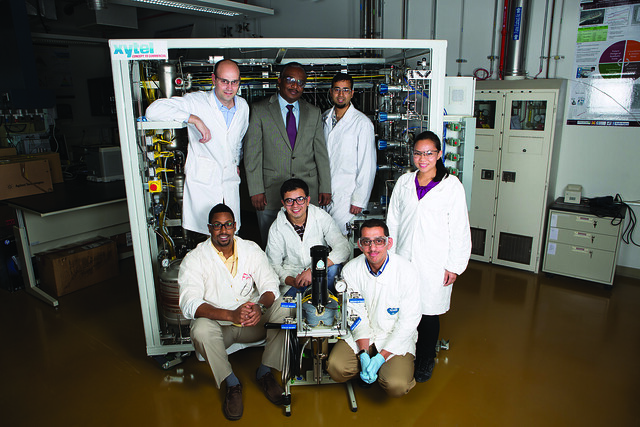
Don’t ask Engineering Dean Chris Roberts about Auburn graduate students unless you’re ready for a deeply devoted reply about the quality of research they conduct, the innovation and expertise they bring to campus, and their numerous contributions to the changing global economy as alumni. You really shouldn’t ask him about Nimir Elbashir, one of his early doctoral students, unless you have some time. Roberts couldn’t be prouder of his former student and colleague, and he is eager to highlight his accomplishments as an Auburn alumnus and fellow engineering educator. And they are many.
Elbashir, ’04 doctoral graduate in chemical engineering, received a $100,000 award during the third annual Qatar Foundation Research Forum held in October. His team was recognized as having the best program to conduct energy and environmental research for its work to advance Fischer-Tropsch reactors in gas-to-liquid processes, a technology he began pursuing as a doctoral student at Auburn. Today, Elbashir is an associate professor in the Department of Chemical Engineering at Texas A&M University at Qatar in the Arabian Peninsula.
“Nimir was enthusiastic when he joined our department,” says Roberts. “He came to Auburn with the industrial expertise and maturity to tackle big things, and he did.”
Elbashir was born in Moscow, Russia, where his father was pursuing a master’s degree in chemical engineering. Afterward, Elbashir’s family returned to Sudan, his parents’ home country, and his father took a job as a chemical engineer in the sugar cane industry. Sudan is one of the largest African sugar producers, following South Africa and Egypt.
“I used to work in the sugar cane factories during summer breaks growing up, and that allowed me to learn about the industry and about chemical engineering,” Elbashir recalls.
He attended the University of Khartoum, the largest and oldest university in Sudan — an extension of the British education system, modeled after University College London and Cambridge University. He studied chemical engineering and graduated with first class honors, going on to pursue a master’s degree in the field at the Universiti Teknologi Malaysia in Johor, Malaysia.
His interests led him across borders again in 1998 when he joined King Saud University in Riyadh, Saudi Arabia, as a research scientist. His project sought to advance catalyst design to convert inexpensive gasses obtained from Saudi Arabia’s crude oil fields into more valuable petrochemical precursors. He worked in collaboration with the Saudi Basic Industries Corporation, one of the world’s leading manufacturers of chemicals, fertilizers, plastics and metals.
[miniflickr photoset_id=72157633504616362&sortby=date-posted-asc&per_page=50]